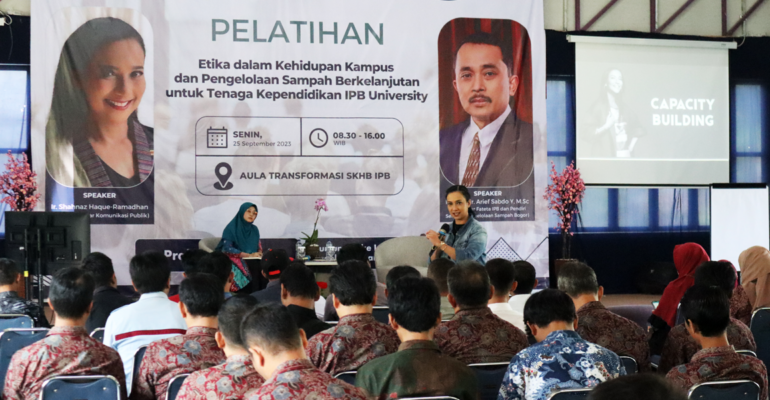Duet Shahnaz Haque and Professor Provide Education for Education Personnel SKHB IPB University

Artist host, Shahnaz Haque provided education on ethics and increased capacity building to the education staff (tendik) of IPB University. This activity was organized by the School of Veterinary and Biomedical Sciences (SKHB) at IPB University in the Hall of Transformation, Dramaga Campus.
Dean of SKHB University, Dr drh Amrozi in his speech said, this training aimed to develop human resources (HR) at IPB University, especially for educational staff (tendik), ranging from cleaning staff, security officers, administrative staff, to educational laboratory administrators. “Because, teaching staff is the front line that represents the face of IPB University,” Dr Amrozi explained.
This training in collaboration with Agrianita was attended by 96 teaching staff in the SKHB environment as well as representatives from each faculty/school.
“When we want to instill an activity into a habit, then remember the formula 2190 blank 2, which means doing it for 21 days to get used to it, then add 90 days or three months for habituation so that the habit is firmly embedded, and may not do it but no more than two days. Then the habit will be strongly embedded in us,” said Shahnaz starting her material.
Furthermore, Shahnaz explained about the 9 levels of human emotions, where 6 levels are negative emotions and 3 levels are positive emotions. Apathy, sadness, fear, greed, anger, and pride are part of negative emotions, while enthusiasm, acceptance, and peace are part of positive emotions.
“Recognize our emotional level and the emotional level of the person we are dealing with. We must be able to control our behavior and speech so that we can provide excellent service,” she added.
Besides Shahnaz, this activity also invited Prof Arief Sabdo Yuwono. The professor of IPB University introduced sorting and composting as part of sustainable waste management.
“As much as 50-70 percent of household waste in Indonesia is kitchen waste that can be composted. If we can manage organic waste with composting, as well as non-organic waste with economic value that we donate to scavengers, then there will be less waste that needs to be transported to temporary shelters (TPS),” explained Prof Arief.
He further explained that composting is assisted by maggot or black soldier fly (BSF) larvae. “Waste composted with BSF larvae has no odor, speeds up the composting process, and produces high-quality compost. Compost products can be sold, including maggot which can be sold as a source of protein for animal feed,” he said.
Participants also had the opportunity to visit Taman Semangat, a landfill site within the IPB Dramaga Campus. At this location, participants can see firsthand how IPB University sorts and processes various types of waste generated by its citizens. (AP) (IAAS/SHY)



